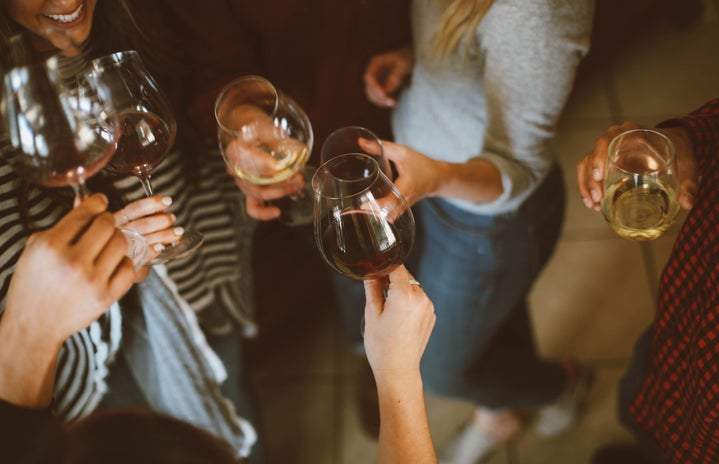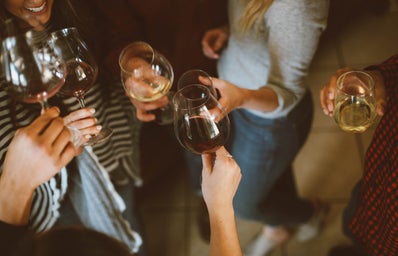Being part of Gen-Z means that I basically spend all of my time just questioning every aspect of my identity, while externally pretending that I have my whole life figured out. I’ve accepted the constant chaos, but I’ve still been trying to (slowly) figure out who I am and who I want to be outside of the bubble that surrounds University Avenue in Waterloo.
What doesn’t help this process is drinking culture, which is quite intense in the teenage years. And if you go on to university, it’s just amplified, more accessible, and widely accepted. For me, the cool-ness of being legal drinking age wore off pretty quickly. As a December-born baby, I felt like I waited FOREVER until I was legal and could go out with my friends to bars and order drinks at restaurants. And then it just became an expensive habit that I always regretted the next day.
With the ongoing pandemic, so many of my peers started drinking at meals with their parents, on Zoom with friends, and on patios when restrictions loosened. People were getting drunk on Netflix Party while I tried to figure out what MadFit workout I would do that day. That being said, there is no judgement — everyone faced quarantine differently. With such a diminished social scene, I too was down to have a drink or two on a patio throughout the warmer months before I began to question what I was doing.
Then I started to see more mentions of sober curiosity on social media, and began to really tune into the content surrounding this phrasing. Sober curiosity is a movement, coined by Ruby Warrington, about exploring sobriety and every aspect of our relationship with alcohol. You can read more about Ruby’s experience cutting out alcohol and the changes that arose here! She is also the author of “Sober Curious: The Blissful Sleep, Greater Focus, Limitless Presence, and Deep Connection Awaiting Us All on the Other Side of Alcohol”. As someone who hasn’t struggled with addiction but is very invested in health, I was keen to learn more about the benefits of choosing to be sober in a culture so consumed with drinking.
How very Gen-Z of me to find something that I feel is damaging to my body and just cut it out completely. Like the revolt against the dairy industry, but make it overpriced cocktails.
As a university student, drinking is often tied with socialization. I felt like there was no point in drinking anything if it wasn’t going to be excessive. Like many young adults, I’m also constantly at battle with food and what I can/can’t eat to make myself feel good — and, of course, what is trendy. Whenever I drank, I would make food decisions that always hurt my body and made me feel guilty that night or the next morning. I questioned my actions: why did I allow myself to eat things I normally wouldn’t just because I got drunk? Why did I only like myself when I was drinking? Why was I only fun when I was out of control? I hated that I felt like I couldn’t be social or confident unless I had a drink in my hand or that I was lame if I didn’t. While I’d like to think I’m funny and quirky at all times (insert God complex), I felt as if the only way I was going to be likeable into my young adult years was if I continued to drink casually.
Watching a long-time favourite influencer of mine, Lauren Elizabeth, share her sobriety journey on her Instagram (see highlight “Sober Stuff”) and Podcast “MOOD,” I began to really process how damaging alcohol is to our bodies. Lauren’s episode “66: Sobriety & Wellness Chat with Arielle Lorre from The Blonde Files!” dives into experiences with rehab, being sober influencers, and navigating the social scene sans alcohol.
While Lauren has struggled with an alcohol addiction and I am just curious about choosing to eliminate the substance, she has really valuable and personable information about combating something so mental and physical, no matter the point in your journey. I also really appreciated an episode of Brooke Miccio and Danielle Carolan’s podcast “Gals on the Go” that features a food influencer who is sober. Their episode titled “how to make big changes in life: veganism + sobriety” features Remy Park (@veggiekins on Instagram).
Their experiences with sobriety really solidified for me that no one else notices or really cares about your alcohol consumption unless it directly affects them. I thought that my friends and family would notice me refusing drinks or having empty hands at socials, but really, we are all too consumed with ourselves to take notice of others in such a focused way. Perhaps the pressing and growing societal flaw of egoism actually helps cancel out the social anxiety surrounding choosing to cut out alcohol?
For me, this is a choice. But I can understand and acknowledge that young adult drinking culture in university is dangerous and could very well lead to addiction. I decided to stop drinking because of the way alcohol made me feel in the moment and because I am constantly thinking about who I want to be in the future. It is a personal choice and I know other young adults can have functional relationships with alcohol. But for me, I’m just over it.
Learning more about sober curiosity has helped to reassure me that while my decisions may seem unconventional in comparison to other Gen-Z university students, they are what’s right for me right now. Drink responsibly or don’t drink at all — just make sure to do what is best for your body and yourself.


